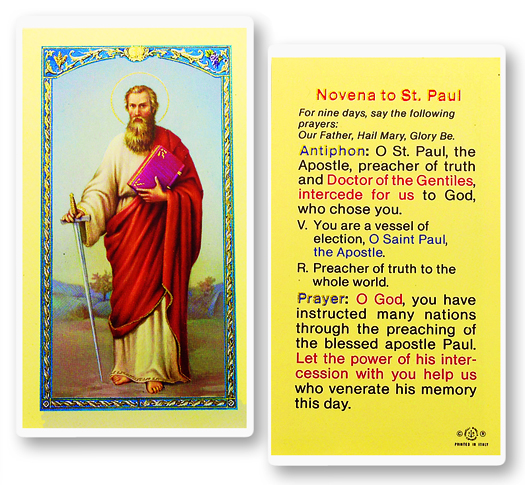The Catholic St. Paul

First, St. Paul did get his commission directly from Jesus Christ, on the way to Damascus. St. Paul didn't just stand up on his own one day and decide to become a preacher. Like Peter and the other 11 apostles, Paul was sent forth by Jesus Christ Himself. St. Paul even says in Romans 10:15 that no one can preach unless he is SENT. Sent by whom? Well, either by Jesus Himself, or one with the authority of Jesus Himself, which would be Peter. We know this from John 20:21, where Jesus says to Peter and the other apostles (the Church on earth), "As the Father has sent Me, so I send you." Jesus also gave Peter the Keys to His Kingdom, in a sign of authority, in Matthew 16:19, where Jesus says that whatever Peter and His Church bind on earth, or loose on earth, will be bound and loosed in heaven. In recognition of this, after Paul had spent 3 years in Arabia following his conversion, he went and submitted himself to the chair of Peter, in Galatians 1:18.
But being sent by Christ to preach to the Gentiles and being submissive to Peter were not the only Catholic things that Paul did. Paul was very keen on oral tradition, something that Catholics today say is just as important as sacred scripture. In 2 Thessalonians 2:15, Paul says to "hold fast to the traditions we taught you, either written or by WORD OF MOUTH. Most protestants today disagree with Paul, saying that all tradition in the Catholic Church is somehow evil.
Paul was also very outspoken on the Real Presence of Jesus in the Holy Eucharist. In 1 Corinthians 10:16-21, St. Paul says that the cup of blessing is a participation in the blood of Christ (not "symbolic"), and the breaking of the bread is a participation in the body of Christ (not "symbolic"). He then goes on to compare the Eucharistic sacrifice of Christ with the Jewish sacrifice on the altar, as well as with the pagan sacrifices on the altar. Now either Paul doesn't know how to write properly and is using false comparisons with other altar sacrifices, OR the Eucharist is indeed a true sacrifice on an altar. Why else would Paul compare the Eucharist to other altar sacrifices? Most protestants don't even have an altar in their church (but they do have altar calls!). As if to emphasize his belief in the Real Presence of Jesus in the Eucharist, Paul continues talking about it in the very next chapter, 1 Corinthians 11:23-30, where he says that whoever eats and drinks the Eucharist in an unworthy manner is guilty of profaning THE BODY AND THE BLOOD OF JESUS (if it's just a symbol, then this would be impossible.) This is why Catholics who practice artificial contraception or who commit other mortal sins such as looking at inappropriate content HAVE TO GO TO CONFESSION FIRST before receiving the Eucharist. Otherwise, they are guilty of yet another mortal sin. Paul goes on to say that anyone who does not discern the Body of Christ in the Eucharist (therefore, NOT A SYMBOL) eats and drinks judgment on himself, and you could get sick and die. This is why non-Catholics are not invited to the Catholic Eucharist, because they do not believe it to be Jesus Himself. Just like in marriage, where the husband and wife become one flesh, in the Eucharist, Jesus becomes one flesh with us. And just like in marriage, there is a preparation before. In marriage, there is the Pre-Cana preparation; with the Eucharist, there is the RCIA preparation.
So what about the sacrament of confession? Did Paul ever say anything about this? Well, yes he did, in 2 Corinthians 5:18-21. Paul says that the ministry of reconciliation (forgiveness of our sins) was given to him by Christ. On behalf of Christ, Paul urges us all to be reconciled with God. Many protestants believe that they can confess their sins directly to God, and not go through a minister, but this philosophy is only to be found in the Old Testament, not the New Testament. For instance, we have St. John the Baptist hearing the people's sins prior to baptism in Mark 1:5, and in John 20:21-23, Jesus gives his priests the power to forgive sins. In James 5:16, he says to confess your sins to one another. And in Acts 19:18, many people came forward confessing their sins and evil practices. Confessing one's sins to a minister of reconciliation is very New Testament. Confessing your sins to God directly is the Old Testament way, and is no longer in force.
Paul also believed in personal mortification, like Catholics do during Lent. In Colossians 1:24, Paul says that he rejoices in his personal sufferings, and completes WHAT IS LACKING IN THE SUFFERINGS OF CHRIST, for the sake of the Church. Now this doesn't mean that Paul thinks that Jesus should have hung on the cross for 4 hours instead of 3 hours. What it means is that we, the Church Militant, in the true imitation of Christ, have to suffer with him, albeit not near as much. Why, because it helps build up the church. It is only through suffering that many people meet Christ. After all, when we are well off and well fed and healthy and living the good life, most people put their confidence in the things of this world, not Christ. By suffering, we come to know Christ as He came to know us - in bodily suffering. Paul also says in 1 Corinthians 9:27 that he mortifies his flesh, so that after preaching to us, he himself will not be disqualified. This not only reinforces the self-mortification aspect of Paul's teaching, it also refutes the heretical "once saved, always saved' teaching of protestants.
And speaking of the false "once saved, always saved" theory, Paul directly refutes it in Hebrews 10: 26-29, when he says that if you deliberately sin after being sanctified by grace, then you can expect nothing less than an ordeal of fire, because you have profaned the blood of the covenant (the Holy Eucharist) by which you were sanctified, and outraged the Holy Spirit. That certainly doesn't sound like once saved, always saved, and in fact, backs up St. Peter in 2 Peter 2:20-22.
St. Paul also believes in praying for the dead. He prayed for the dead Onesiphorus in 2 Timothy 1:16-18, asking not only blessings for his household, but for Onesiphorus to receive mercy at the final judgment.
Purgatory? St. Paul says in 1 Corinthians 3:12 -15, that a man's work will be tested with fire on his judgment day. If the man has good works, then he will receive an immediate reward. if it is burned up, then he will eventually be saved, but only through fire. Since people who go to hell are never saved, then this can only be referring to the cleansing fire of purgatory.
St. Paul also didn't preach that the bible alone is his philosophy. Rather, in 1 Timothy 3:15, St. Paul says that the Church is the pillar and bulwark of truth, rather than sacred scripture, which many protestants hold up to be the pillar and bulwark of truth. Catholics agree completely with St. Paul here.
And St. Paul was not only celibate, he recommended celibacy. Many protestants mistakenly believe that celibacy leads to child abuse, which is crazy, because Jesus, St. John the Baptist, and St. Paul were all celibate. St. Paul says in 1 Corinthians 7:8-22, that marriage is ok, but IT IS BETTER TO REMAIN UNMARRIED, because then you are trying to please the Lord, not your wife.
St. Paul didn't believe that good works were useless, filthy rags either, like some protestants preach. Rather, he believed that they were the fruit of our faith, like he says in Colossians 1:10 - "We should live a life pleasing to God, bearing fruit in every good work." Paul does condemn the useless works of the law like circumcision, in Romans 3:28. Luther mistranslated this "works of the law" into "good works," which does not agree with other scriptures like James 2:24, where God says that we are justified by works, and not by faith alone. It's sad how so many people today still believe Luther and not James. As if to emphasize his belief that salvation is not a one time decision, but a continuous journey until death, Paul says in Phillipians 2:12 to "WORK (there is that word again) out your salvation with FEAR AND TREMBLING." (This is not the cocky self assuredness that most protestants preach today!).
And finally, what about the Rapture? The rapture is a mistaken protestant belief that Jesus will come in secret, and snatch believers up to heaven, leaving everything else behind, including their clothes. Then there will be a 7 year tribulation, where the rest of us will get a second chance to be saved. This is NOWHERE to be found in scripture. St. Paul mentions the second coming of Jesus in 1 Thessalonians 4: 15-17. But Paul says that the dead will rise first, and that there will be a huge trumpet blast. So this event doesn't appear to be some secret snatching away of believers. Seeing the dead rise first with a huge trumpet blast is nowhere to be found in any of the "Left Behind" series of novels. And since the dead will rise first, we know that this will be the last day of human history. This is confirmed by St. John in John 6:40.
So don't let anyone try to hold St. Paul us as some kind of Protestant. St. Peter says in 2 Peter 3:16 that many of his writings are hard to understand, and many do so to their own destruction. This was true in the first century, in the 16th century when Luther and Calvin got it wrong, and it is still true today with all of the TV preachers preaching health and wealth as the Christian message..

Catholicbible101.com
Last edited:
